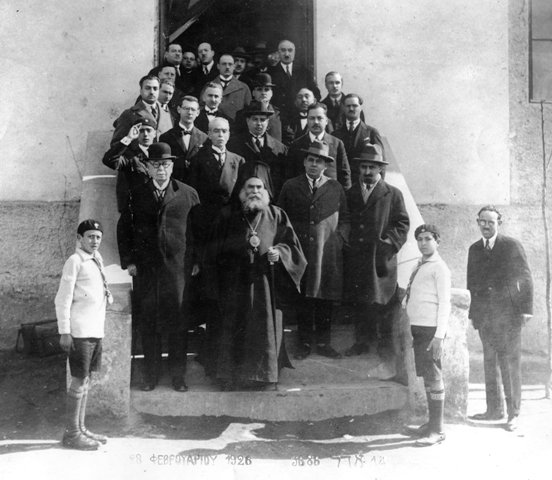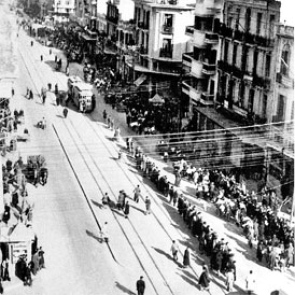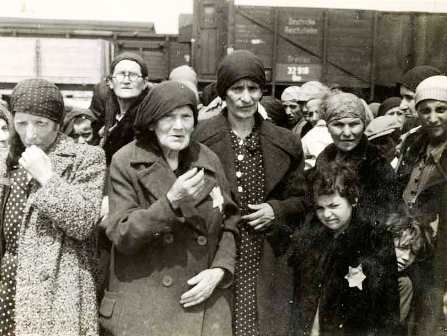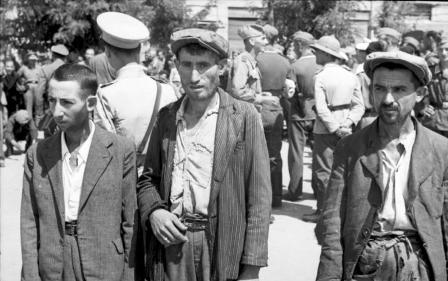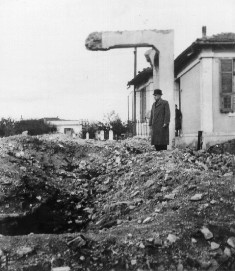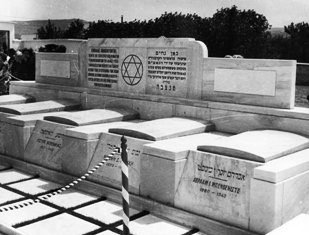Holocaust Education & Archive Research Team |
|
Trials Introduction to the Holocaust Trials
Trials
Interrogations & Testimonies
The IMT Series Nazi Justice | |||||||
The Deportation of the Jews from Salonika Testimony of Itzchak Nechama – Selected Extracts Eichmann Trial Jerusalem 1961 (Selected Extracts)
State Attorney Bar-Or: Where were you born Mr. Nechama?
Witness Nechama: In Salonika, in 1910. I am 50 years old.
Question: When were you released from the Army?
Witness Nechama: When the Greeks left everything, when the Germans came.
Question: When was that approximately?
Witness Nechama: Approximately at the end of March 1941
Question: Did you return home from the front?
Witness Nechama: I walked for 28 days. This is easily said, but hard to do. When I arrived at home I was exhausted. While I was on my way home we had trouble with the Greeks all the time – they wanted to take us for work, to help them and be forced to work for 24 hours. I had to work, I had no choice. So when I arrived at home my situation was very bad.
Question: After the 28 day march, were the Germans already in Salonika ?
Witness Nechama: They were already there and when I came home I was told that our radio had already been handed over. I had a very good radio.
Question: To whom?
Witness Nechama: There was an order that all Jews had to hand over their radios within twenty- four hours, otherwise they would be executed, and because they were afraid they did not even wait for me before handing over the radio.
Question: Did other things also have to be handed over in those days?
Witness Nechama: Every day there was something new. Next one had to hand in the pianos; most Jews owned pianos and every Jew had to give up his piano. Then the telephones, Jews were forbidden to use the telephone. It had to be handed over to the Company.
One day three trucks arrived and took the complete library of holy books which we had in the Community, books from before the time the Jews left Spain. Our Rabbis cried so much when they took those books, I remember it to this day. I recall the tears of those learned men who said: Nothing matters to us, only these books.
Question: Mr Nechama, you were in the army, are you familiar with uniforms. You were able to recognise uniforms. These people who took the books, or those who occupied themselves with the delivery of the pianos and all the things you mentioned – how were they dressed?
Witness Nechama: That was the Gestapo. The colour was brown, a kind of brown.
Question: Were there German Army personnel walking around in Salonika?
Witness Nechama: Of course. Salonika was the military centre and soldiers came there every day from all kinds of units.
Question: When you returned did you continue to go about your business?
Witness Nechama: Of course, a stationery business. I had a partner who was a Yugoslav citizen and did not go to the front.
Question: And he remained and ran your business?
Witness Nechama: Yes.
Question: In which quarter was this? Was it a Jewish quarter?
Witness Nechama: Yes. No in a Greek quarter Question: Tell the Court what happened to the Jewish businesses in Salonika in those days?
Witness Nechama: Yes.
I shall tell you there were troubles for the Jews every day. They would come and take merchandise without paying, without anything. In Salonika there were very rich Jewish businessmen, one can definitely call them rich , one can call them millionaires. There was a shop for glassware there – they took the very last glass.
Question: They took things and did not pay?
Witness Nechama: Yes.
They did not pay. There were shops, iron warehouses – they took all the iron and did not pay anything. Perhaps they “bluffed,” giving out chits as they did for the radios. They gave us slips of paper which were not worth anything.
Presiding Judge: Were you concentrated in a certain quarter in one neighbourhood?
Witness Nechama: Yes. This is just what I want to recall – on 11 July 1942 – there was an official newspaper they had, Das Neue Europa (The New Europe). Presiding Judge: A newspaper belonging to the Germans?
Witness Nechama: Yes. A newspaper belonging to the Germans. It was a morning paper. And there was another newspaper in the afternoon, and there appeared an order that all the Jews aged 18 to 45 had to report on the morrow, Saturday (this appeared on Friday) at Liberation Square, a very large square. Question: Did many Jews come?
Witness Nechama: Yes. 9,000 Jews reported there. Question: And were you among them?
Witness Nechama: Yes. Yes Question: And what happened at the Square?
Witness Nechama: Yes. I shall tell you. I had hardly managed to get there – I was wearing my Sabbath clothes – when they started beating us, at once, at once, at once. Question: Who were they?
Witness Nechama: Yes. They must have been the SS. State Attorney Bar-Or: I now show you a photograph of a man having water poured over him from a bucket. Maybe you can remember and tell the Court what this is?
Witness Nechama: Yes.
I shall tell you. They dealt out so many blows that people fainted, so then they would lift them up, pour water over them and start again. An order had been given to form lines without moving, and the sun was very strong and the Jews were not able to stand in the sun for a long time; but they were so slow making their arrangements, that many could not stand it.
They also wanted to have fun, they did it for laughs. When they were in a certain row, an SS policeman would come and push them away and start hitting and fooling around. And at the windows there were Germans taking photos of them and applauding.
State Attorney Bar-Or: Finally, Mr Nechama, I show you a picture exercising at the orders of a soldier – Army or SS, it is impossible to specify this here – who is standing in front of him. Do you recognise this picture?
Witness Nechama: Yes. It is me. Presiding Judge: Is this you with your knees bent?
Witness Nechama: Yes. That is me. If you could have seen me on Saturday at 2.30, the state I was in after these exercises, the blows I got, why – I do not know. I did not do anything to them, I did not owe them anything and in the end they gave me a bloody thrashing. And not only me, but my family also. Question: Who took these pictures, Mr Nachama?
Witness Nechama: Yes. It could be that the German girls up on the balconies, that they photographed such things. There were girls standing there and every time there was a beating or something like that they applauded gleefully. State Attorney Bar-Or: Mr Nechama, what happened after these gymnastics?
Witness Nechama: Yes. I will tell you, they took me and beat me and organised all kinds of exercises and after that there were more beatings and more. And then I was taken to a doctor. If I were in Salonika now I could bring the doctor; he is alive and well, it is Doctor Kopers. The doctor was fetched and he treated me. I was sick for two weeks; for four days I was unconscious. After three weeks, when I was beginning to recuperate, there appeared a notice in the newspaper that numbers so and so had to report for work immediately. The notice was from Mueller.
Question: How did you know that you had to go to work?
Witness Nechama: Yes. On the document I had there was a number, and if I am not mistaken, my number was 190, and in the newspaper this number was also listed. Question: Was the number published in the newspaper?
Witness Nechama: Yes. Numbers, numbers, numbers. There were 540 of us. We reported at some community, our community, “Yosef Nissim,” that was the name of the community.
Presiding Judge: You mean synagogue?
Witness Nechama: Yes. Yes. Question: What is the name of the synagogue?
Witness Nechama: Yes. Yosef Nissim. And there were two Greek doctors there. They were not really Greek, but German, they were only called Greek, and they had to confirm that they had examined us and that we were alright. . State Attorney Bar-Or: What really was the condition of the people who went to work?
Witness Nechama: Yes. They were weak. Question: Why were they weak?
Witness Nechama: Yes. Because they had already suffered for a year under the Italians during the War. We had no food, we suffered from starvation. Question: Where did you go from there?
Witness Nechama: Yes. First we showered, then we reported for duty, and I went to Uberland. The work was at some kind of factory. It was a firm of some kind. It was at an aerodrome in Greece, I had to do quarrying there and preparatory work for an aerodrome. State Attorney Bar-Or: Do you remember the name of the German who was in charge of all this work?
Witness Nechama: Yes. Mueller Question: How long did you work there?
Witness Nechama: Yes. I worked there for three weeks and there was no food. We had a hundred grams of bread every 24 hours and one litre of soup made of sour cabbage. Everybody had dysentery, and everybody’s legs were swollen. It was impossible to work. And if you could not work, you were beaten. We had a foreman, a Croat, curse him – if he is alive.
Question: After these three weeks you returned to Salonika?
Witness Nechama: Yes. We did not return because we had many casualties; many people had died. So the women went to our Community, they cried and caused an uproar there. And the heads of the Community decided to buy off the work of the Jews. They paid about 10,000 dollars for it. If you want to know exactly, this was two and a half billion drachmas. Question: And the Community paid this?
Witness Nechama: Yes. Yes.
Question: To whom did they make the payment?
Witness Nechama: Yes. I’ll tell you, the community did not pay from its funds, the rich people paid, every one of them, until the whole sum was collected. Question: To whom was the sum paid?
Witness Nechama: Yes. To the Commandant’s office. Question: And after this payment you were freed and returned to Salonika?
Witness Nechama: Yes. Yes. Question: And you remained in Salonika?
Witness Nechama: Yes. But there were still problems. There were young men, blessed be their memory, and among them were my brother. The partisans appeared on the scene and they wanted to take their revenge on the Germans. And who were the victims? – the Jews. So the Germans decided to put Jewish guards in places where the railway had to pass. Every 20 kilometres there had to be a guard manned by young Jews, who were replaced every 24 hours.
And they let it be known that if, heaven forbid, something were to happen along the railway line they would kill the entire Jewish guard. Imagine under what conditions the Jews lived then! The partisans knew about this and they refrained from doing anything.
Question: Until when did you remain in Salonika?
Witness Nechama: Yes. I remained in Salonika until 26 April 1943. Question: And what happened then?
Witness Nechama: Yes. They started the transports. Question: And then what happened?
Witness Nechama: Yes. Before the transports, after we were finished with the work, we were left in peace for a short while. Then suddenly they announced that the Jews had to have a designation saying “Juedisches Geschaeft” (Jewish Business) – I myself had to this. Question: In Greek and German?
Witness Nechama: Yes. In Greek and German. And any German soldier could walk into the shop and take whatever he wanted without saying a thing. Next they announced that the Jews had to be put into a ghetto. But there were 60,000 Jews in Greece and it was difficult to put them all into a ghetto. So what did they do?
They employed special engineers to prepare plans for constructing ghettos, and they put up six ghettos. Those people whom they could not crowd into the ghettos were ordered to leave their homes and move into some shed or wherever, only they had to be in the ghetto.
Question: But not in their home?
Witness Nechama: Yes. Not at home; the homes were taken over by the Germans. I have to mention an important event prior to that: There was a Rabbi Gaon of blessed memory in Salonika, who lived on the ground floor of a house occupied by Germans, and on the third floor of that house there lived a German General.
Suddenly one day at 5:30 in the morning, he sent a soldier to call the Rabbi upstairs. An hour and a half later the children downstairs heard a noise. What happened? Father has not come down?
When they opened the door they found the Rabbi lying on the floor unconscious, and with no hair. His hair and beard had been shorn off. And this was such a disgrace for him, that he wanted to live no longer.
Question: Now we shall perhaps come to April 1943, what happened then?
Witness Nechama: Yes. I remained in my home in Salonika because in my house there was typhoid, the neighbour upstairs had typhoid and the building had been put in quarantine. The Germans had heard about the quarantine and kept kilometres away. They were afraid and did not come to me. The quarantine was to be for 21 days. Meanwhile there were no Jews left in Salonika. They were all gone, partly on transports and partly to “Baron Hirsch,” which was the centre, the ghetto.
Question: They had to be collected there?
Witness Nechama: Yes.
Yes. I was sure that my house in Salonika would be spared, and I made all kinds of plans to escape. I had a brother-in-law living outside Salonika and he made all the preparations so that I would be able to stay with him. Presiding Judge: Were you a bachelor?
Witness Nechama: Yes. No, I was married – I had a plan how to escape the next day. At 6 o’clock in the morning they came from the Gestapo with a list and said: In half an hour you have to be ready to go to “Baron Hirsch.” So I called the Police Commander in my district and he started to argue.
Presiding Judge: Was he Greek?
Witness Nechama: Yes. Yes, Greek. He started to argue with the Gestapo Doctor. At that time I did not know German at all, but he knew it well. There was quite a serious discussion, but then he said: Itzchak, nothing can be done, you have to go. State Attorney Bar-Or: Did you go?
Witness Nechama: Yes. Yes. Question: What happened?
Witness Nechama: Yes. When I came to “Baron Hirsch” it was full of lice. My wife began to cry, what was one to do, one had to be patient. Question: How long did you stay there?
Witness Nechama: Yes. Only 24 hours , one night. Then we had to go to an office where we were told that we would have to change all our money and that we would get zlotys, “because you are going to Poland, to a place named Beserko.” I do not remember exactly, near Sosnowiec. They said this was in Cracow. They told us that we had to hand over our money and receive zlotys.
Presiding Judge: What happened, did they deport you?
Witness Nechama: Yes. Yes, they deported me to Auschwitz.
Question: How long did you remain in Auschwitz?
Witness Nechama: Yes. I stayed 38 days in Auschwitz. State Attorney Bar-Or: When you arrived at Auschwitz and climbed down from the train- what happened? Not what happened the next day, but what happened when you actually left the train? How many of you were from Salonika?
Witness Nechama: Yes. We were exactly 78. That was the smallest number. The situation was terrible. Imagine, men, women, young men and girls, how could they live in such conditions. We had been told we were going to Cracow, take with you what you want. Some people took umbrellas because it snows there and rains, so one needs an umbrella, there was so much baggage that one could not move, we did not sleep at all.
Question: When you climbed down from the train in Auschwitz – what happened?
Witness Nechama: Yes. I shall tell you. I was one of the first to climb down. When I came down I saw immediately people wearing pyjamas. I was lucky they were French and I understand French quite well. I said to them: “What is going to happen here?” “You will find out later,” they replied. “Alright, explain. It is forbidden to explain now!” I did not even manage to see my wife. The beating went on, the crying, father looking for son.
Question: As far as you know, are there others still alive, and how many?
Witness Nechama: Yes. :I’ll tell you, 56,000 Jews left Salonika on the transports and only 1,950 of them returned. Presiding Judge: How many of those who went with you and whom you knew returned?
Witness Nechama: Yes. I can tell you exactly four live here. Judge Halevi: Were you sent to Auschwitz together with your wife and your family?
Witness Nechama: Yes. :Only with my wife, since my parents had left before me. I told you that I should have escaped. My parents had already left two weeks before me. Question: Did your wife travel together with you?
Witness Nechama: Yes. Yes. Only I remained alive. Of the whole family, my father, my mother, four sisters, my brother and my wife, I alone remained. Presiding Judge: Thank you very much, Mr Nechama, you have completed your evidence.
Sources:
The Complete Transcripts of the Eichmann trial – Nizkor US National Archives Holocaust Historical Society Auschwitz Chronicle by Danuta Czech published by Henry Holt & Company New York 1989
Copyright. Graham Marriott, Chris Webb & Carmelo Lisciotto H.E.A.R.T 2010
|
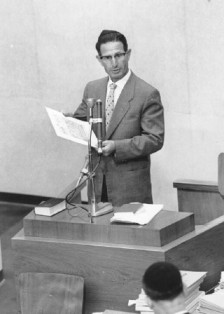
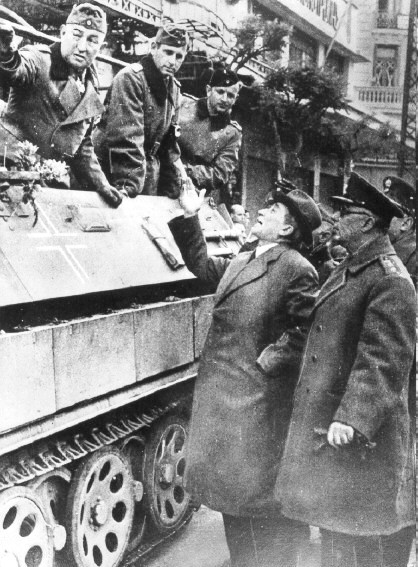
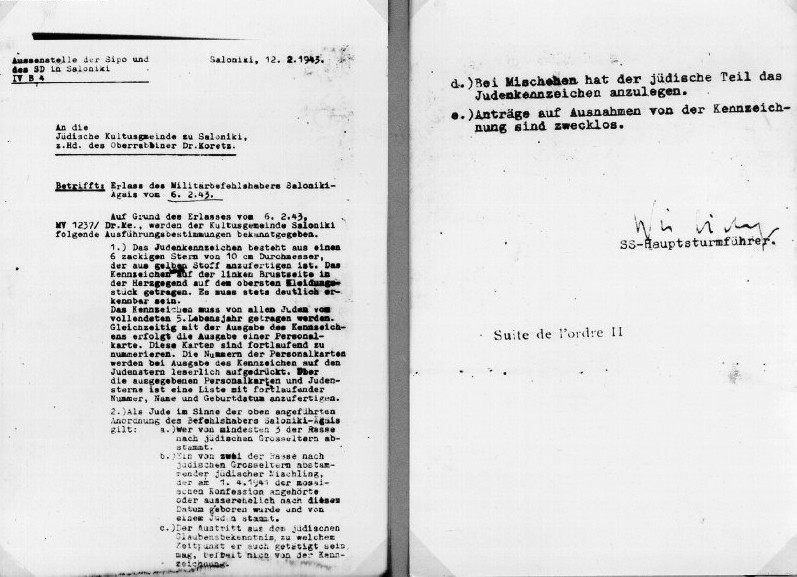
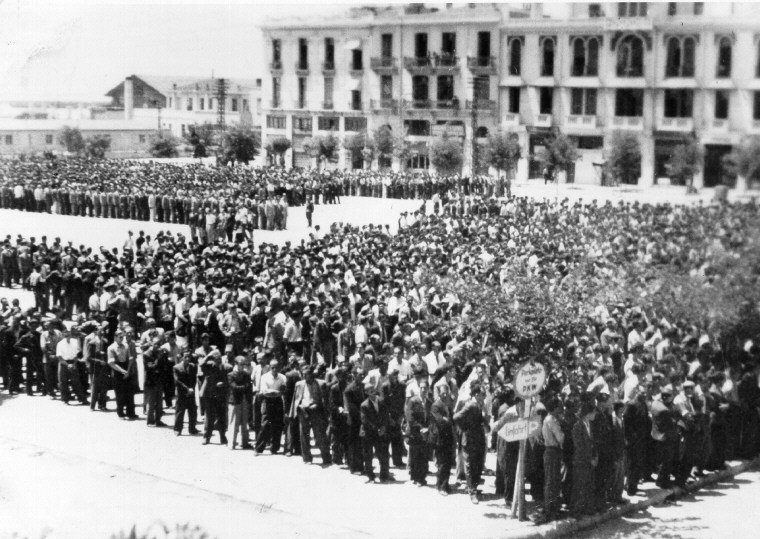
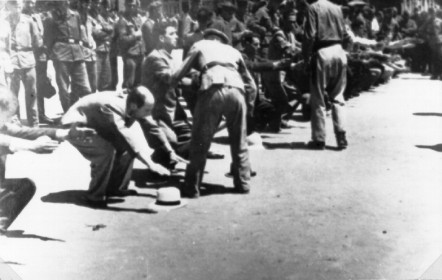
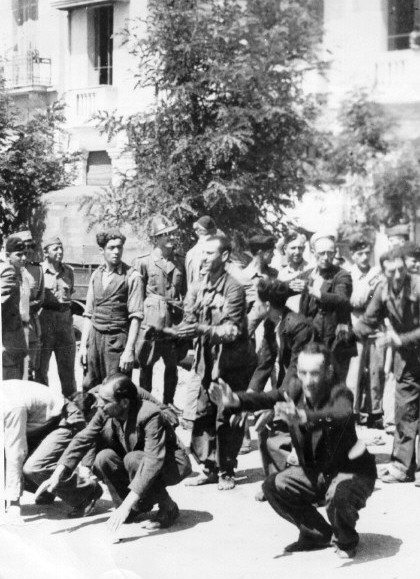

%20Dutch%20war%20criminal%20involved%20with%20the%20deportation%20of%20the%20Jews%20of%20Macedonia%20and%20Salonika%20to%20extermination%20camps.jpg)
